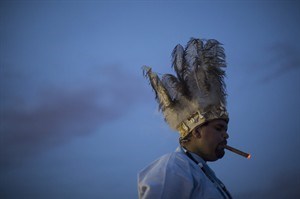
A man prays during a ceremony in honor of Iemanja, goddess of the sea, at Copacabana beach, in Rio de Janeiro, Brazil, Monday, Dec. 29, 2014. As the year winds down, Brazilian worshippers of Iemanja celebrate the deity, offerings flowers and launching boats, large and small, into the ocean in exchange for blessings in the coming year. The belief in the goddess comes from the African Yoruban religion brought to America by West African slaves. (AP Photo/Felipe Dana)
December 29, 2014 - 3:50 PM
RIO DE JANEIRO - Swathed in white and bearing bouquets of lilies, thousands of practitioners of the Afro-Brazilian Candomble faith are paying honour to the sea goddess Iemanja in a traditional New Year tribute on Rio de Janeiro's Copacabana beach.
A towering statue of the goddess in her flowing robes was carried by truck to the beach Monday. Worshippers launched their offerings upon the Atlantic: toy-sized boats laden with flowers and earthenware bowls brimming with candles and fruits.
Believers such as 67-year-old Sonia Santos ask the goddess for blessings in the coming year. "Iemanja is our mother and she never lets is down," said Santos, who hopes for "courage and peace for myself and my family."
Such annual offerings have helped Candomble and Umbanda, another religion rooted in West African traditions, gain wider acceptance in Brazil after long being shunned as forms of witchcraft, said Ivo de Carvalho, a 79-year-old community leader wearing a white turban.
"Seeing this big crowd here, all dressed in white, praying peacefully, it helps people understand how peaceful our religions really are."
News from © The Associated Press, 2014